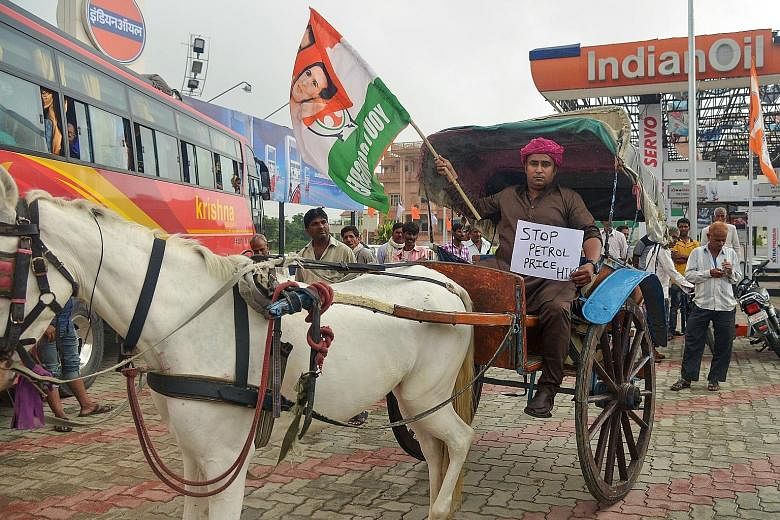India was gripped by a strike and protests nationwide yesterday as opposition parties launched a campaign against rising fuel prices in what is described as their biggest political action against the government of Prime Minister Narendra Modi ahead of a general election next year.
The Congress, the main opposition party, claimed it had the support of nearly two dozen others for the campaign. As part of the general strike, there were marches in different parts of the country, and businesses, government offices and schools were shut down.
Protesters also interfered with the running of trains and petrol pumps, and buses were vandalised.
Congress president Rahul Gandhi, who led a protest march in the capital, New Delhi, blasted Mr Modi, saying his policies were responsible for the higher fuel prices and the weakening rupee.
"In the entire country, the prices of fuel, gas are on a constant rise, but PM Modi remains in silence. The rupee value has never been this weak in the past 70 years," he said. "Farmers, labourers see no light at the end of the tunnel."
Former prime minister Manmohan Singh, who was at the protest, made a plea for opposition unity against the ruling Bharatiya Janata Party (BJP). "The need of the hour is for different parties to set aside their differences and come together," he said.
Fuel prices, which differ from state to state because of different local taxes, have gone up sharply in India over the last couple of weeks. In Delhi, for instance, petrol prices have increased by 14 per cent over the past year, with a litre now costing 80.73 rupees (S$1.54).
The weakening rupee, which hit a new record low of 72 to the US dollar last week, has exacerbated the problem as India relies on imports for most of its oil. Federal and state taxes account for more than half of the price of petrol and diesel, and they remain one of the biggest sources of income for Mr Modi's government.
The opposition has demanded that the government should cut the duty on imports to reduce costs and also make the price of fuel standard across the country by bringing it under the goods and services tax.
But the government has made little concession so far on the issue, instead accusing the opposition parties of being opportunistic.
The BJP on Monday denounced the protest, dubbed "Bharat Bandh" or "India strike" by the Congress, saying its opponents were "unnecessarily politicising" the issue of fuel price hikes, which it blamed on external factors.
"Everyone has a right to protest but what is happening today? Petrol pumps and buses being set ablaze, putting lives at risk," said Law Minister Ravi Shankar Prasad.
"People are against Bharat Bandh because they understand that the rise in fuel prices is temporary and due to factors beyond the control of government."
Mr Prasad claimed that a two-year-old girl died because an ambulance was stuck in a traffic jam caused by protesters.
India is due to hold a general election before May next year but ahead of it, a number of BJP-ruled states, including Rajasthan and Madhya Pradesh, are due to hold polls.
Some analysts noted that yesterday's strike action indicated that efforts at political unity among the opposition parties were bearing some fruit.
"They seem to be coming together. They have no alternative. Otherwise, they cannot take on Modi. So it's a compulsion. And Bharat Bandh is one issue," said Delhi-based political analyst Amulya Ganguli.
Professor Bidyut Chakraborty of Jawaharlal Nehru University, however, said the opposition took a gamble with the strike.
"This is not the way of addressing the price rise. It just makes life miserable in some places," he said.

